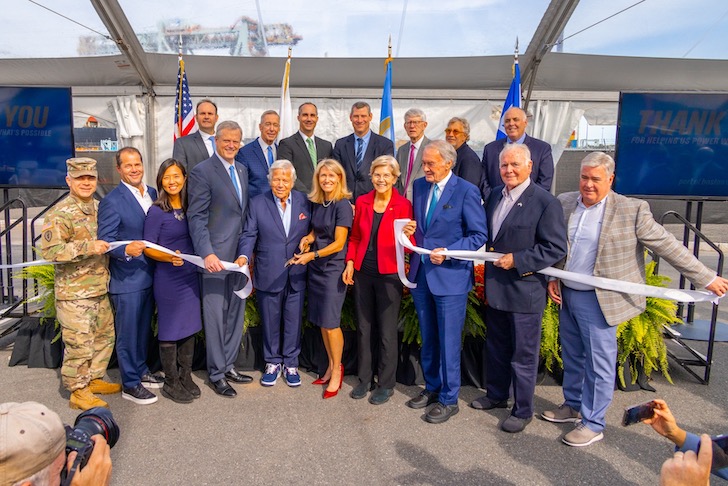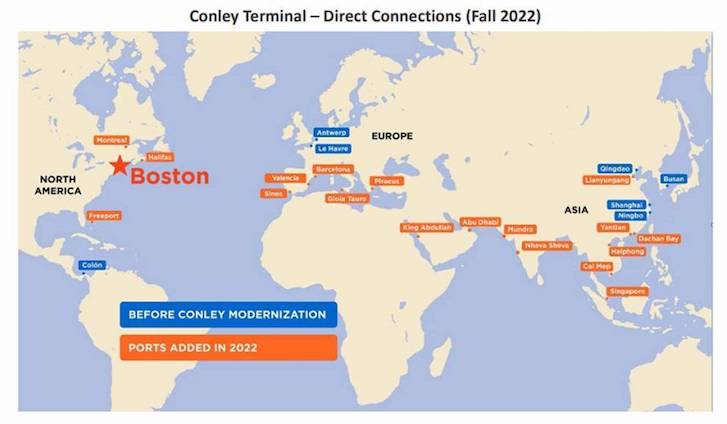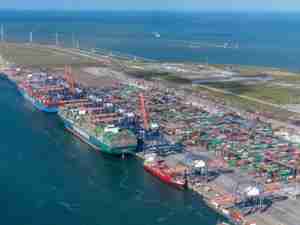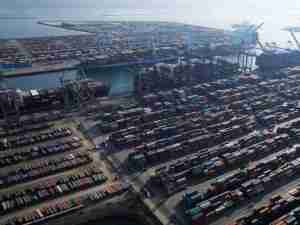The Massachusetts Port Authority (Massport) welcomed elected officials, customers and stakeholders to the Paul W. Conley Container Terminal to celebrate the completion of critical infrastructure investments as part of a nearly $850 million plan to upgrade the Port of Boston. The multi-year investment, made possible by the support of our State, Federal and local partners, is already paying dividends, with bigger ships, new services and connections to more global ports.
“Supporting these critical infrastructure projects at Conley Container Terminal is crucial to Massachusetts and New England’s competitiveness in the global marketplace,” said Governor Baker. “I am thankful for the collaborative efforts of our federal and state partners and Massport to help protect the thousands of local jobs throughout the Commonwealth and the future growth of the Port.”

Prior to the Port’s modernization, Conley offered two services reaching seven major global ports. With the completion of these significant infrastructure investments, Conley Terminal now offers direct connectivity to China, North Europe, Southeast Asia including Vietnam and India, the Mediterranean, Middle East and Latin America through five services, with a sixth service scheduled to start in October. With direct connectivity to 25 global ports, Conley is offering more opportunities than ever before for importers and exporters to compete in the global economy.
“With a deepened Boston Harbor and modern container facilities, the Port of Boston is providing greater global connections for Massachusetts businesses and supporting thousands of jobs,” said Massport CEO Lisa Wieland. “None of these infrastructure improvements would have been possible without the leadership and support of our Federal, State, and local elected officials and the business community.”
The Port of Boston generates $8.2B in annual economic impact, and supports more than 66,000 jobs. As the only full-service container terminal in New England, Conley Terminal enables more than 2,500 businesses throughout the Commonwealth and New England to ship and receive products globally, including furniture and home goods, footwear, clothing, office supplies, wine and spirits, recycled fibers, sporting goods, seafood and more. The extraordinary investments and significant support from the Massachusetts Congressional Delegation, the Baker-Polito Administration, and the Massachusetts Legislature allowed Massport to modernize and expand Conley Terminal, making the Port more attractive to new business today and in the future.

Completed Infrastructure Projects
· Butler Freight Corridor, a dedicated truck route to keep container trucks off residential roadways and allow trucks to access the highway system in minutes;
· New 50-foot-deep berth, to accommodate the new cranes and larger ships;
· Three ship-to-shore cranes, to serve ships carrying up to 14,000 TEUs;
• The new cranes are fully electric, and produce no diesel emissions;
· Boston Harbor Dredging, a multi-year, multi-phase partnership between the Commonwealth of Massachusetts, Massport and the U.S. Army Corps of Engineers to deepen the main ship channel and Reserved Channel to -47 feet and the outer harbor to -51 feet, and expand the Turning Basin for larger vessels; and
· Other terminal improvements: including new rubber-tire gantry cranes, expanded container storage and new refrigerated container racks.
Ongoing Infrastructure Projects
FASTLANE Grant Projects:
· Improvements to Berths 11 and 12, ensures state of good repair for existing berths;
· Refrigerated container storage improvements, provides additional capacity for refrigerated cargo;
· Terminal technologies and equipment upgrades, including LED yard lighting, improved Wi-Fi, and power retrofits to rubber-tired gantry cranes increase the overall operational efficiency of the terminal and reduces emissions; and
· New gate processing facilities, will optimize traffic flow and increase safety in the terminal.
BUILD Grant Projects:
· New container yard behind Berth 10, will increase Conley’s container storage capacity by nearly 30%;
· New Cypher to E Street Freight Corridor, will improve connections to the interstate highway system for freight dependent uses and industrial businesses in the Port of Boston, including Conley Terminal; and
· Terminal technologies, will ensure a congestion-free terminal by minimizing wait times and enable the introduction of a truck appointment system.
“I’m glad to join my federal, state and local partners in celebrating the completion of nearly $850 million in infrastructure projects to modernize Conley Terminal,” said Senator Elizabeth Warren. “These investments in the working port of Boston and the good paying, union jobs created by them are critical to ensuring a diverse economy for Massachusetts. I will continue to fight for federal resources like this that will help fortify and expand our supply chain and advance the Commonwealth’s competitiveness on the global stage.”
“Mainsails and masts may have given way to container ships in Boston Harbor, but the Port of Boston’s position as a global maritime leader persists,” said Senator Edward J. Markey. “I am proud to have helped lead my Senate and House colleagues in securing $217.5 million in federal funding for the deepening of Boston Harbor and the expansion of Conley Terminal, ensuring the harbor continues to serve as an economic anchor for the entire New England region and remains competitive in our global economy. I am grateful to our federal, state, and municipal partners – as well as the Army Corps of Engineers and the union workers at the Port of Boston – for their collaboration in this effort.”
“Despite the pandemic-related impact on air travel and ocean-going commerce, we have been very successful in obtaining funding to make major improvements and expand our capacity both at Logan and in the Maritime Port of Boston,” said Congressman Stephen Lynch. “I give great credit to CEO Lisa Wieland and her team at Massport, and of course I am grateful for the support of the Massachusetts Congressional delegation, Secretary Buttigieg and the Biden Administration. These Massport projects have effectively modernized our port infrastructure, created thousands of good-paying jobs and expanded the economic viability of the entire New England region. There is more work to do but I am pleased with all the progress we’ve made in a challenging economic environment.”
“The Port of Boston is a vital gateway connecting the global marketplace with businesses across Massachusetts and New England,” said Boston Mayor Michelle Wu. “The expansion and modernization of this terminal mirrors our city’s commitment to support and invest in the local economy, contributing to the sustainable growth of local jobs and businesses.”










